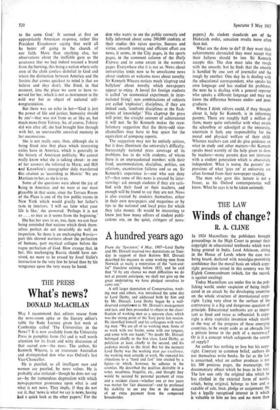What's news?
TIIE PRESS DONALD McLACHLAN
May I recommend that editors rescue from the news-room spike or the literary editor's table the Rode Lecture given last week at Cambridge called 'The Universities in the News'? It is now available from the University Press in pamphlet form (5s) and is well worth attention for its frank and witty discussion of that sacred cow—the news. The author, Sir Kenneth Wheare, is an irreverent Australian and distinguished don who was Oxford's last Vice-Chancellor.
He is puzzled, as all intelligent men and women are puzzled, by news values. He is probably also irritated—though he does not say so—by the tremendous dogmatism with which newspapermen pronounce upon what is and what is not news. They imply, if they do not say it, that 'news is what we say is news, having had a quick look at the other papers.' For the don who wants to see the public correctly and fully informed about some 200,000 students at their studies this raises queries. Success and virtue, smooth running and efficient effort are news, it seems, in the City pages, in the sports pages, in the comment column of the Daily Express and to some extent in the women's pages. Everywhere else it is not so. News about universities tends now to be unwelcome news about students or welcome news about novelty. Sir Kenneth Wheare notices much 'claptrap and ballyhoo' about novelty which newspapers appear to enjoy. A hostel for foreign students is called 'an ecumenical experiment_in inter- national living'; new combinations of subjects are called 'explosive'; disciplines, if they are indeed such, 'confront disciplines at the flash- points of knowledge.' This claptrap the press will print; the straight account of achievement it will not. So Sir Kenneth makes the revo- lutionary suggestion that the thirty-odd vice- chancellors may have to buy space for the equivalent of company. reports.
The suggestion may not be entirely serious, but it does illuminate the university's difficulty. Increasingly national press coverage of its problems has to do with students, of whom there is an unprecedented number; with their food, accommodation, discipline, politics, sex relations, examination failures and so on. Sir Kenneth's experience is—and who can deny it?—that some of this news is created by inter- viewing: ask enough students if they are satis- fied with their food or their teachers, and enough will be found to say they are not. News is also created by students themselves, either in their own newspapers and magazines or by tips to the national and local press for which they take money. (It would be interesting to know just how many editors of student publi- cations are, on the quiet, stringers of news-
papers.) As siudent standards are of the Hickeyish order, sensation results more often than not.
What are the dons to do? If they want their achievements chronicled they must accept that their failures should be too. Sir Kenneth accepts this. The don must take the rough with the smooth; but he finds that the smooth is handled by one sort of journalist and the rough by another. One day he is dealing with the educational correspondent, who speaks his own language and has studied his problems; the next he is dealing with a general reporter who speaks a different language and may not know the difference between under- and post- graduate.
Where I think editors could, if they thought about it, help Sir Kenneth, is in informing parents. There are roughly half a million of them, many quite unfamiliar with what awaits the schoolboy or schoolgirl at the university, uncertain it feels any responsibility for the moral and physical welfare of their child. Whereas teachers can and do give guidance on what to study and other matters—Sir Kenneth speaks most warmly of the help given to dons by teachers—many parents dare not intervene with a student generation which is obsessively independent. What is worse, the parents' im- pressions of what 'goes on' at university are often formed from their newspaper reading.
The man who gave this lecture is not a fusser, as his Oxford contemporaries well know. What he says is to be taken seriously.


































 Previous page
Previous page